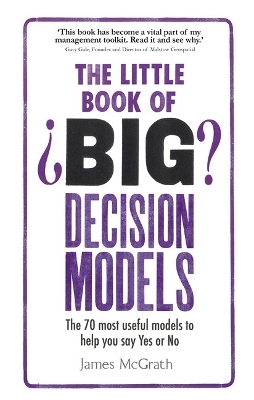
Little Book of Big Decision Models, The
Pearson Business (Verlag)
978-1-292-09836-4 (ISBN)
James McGrath worked as an accountant and senior manager in industry, local government and as a self-employed management consultant before becoming Course Director for the MA in Education and Professional Development at the City of Birmingham University.
Chapter 1 - The principles of decision making
Introduction
Model 1: Townsend’s rules of decision making
Model 2: The McNamara fallacy - The vital information that decision makers ignore
Model 3: Using quantitative (hard) and qualitative (soft) data in decision making
Model 4: Kreiner and Christensen the consequence model
Model 5: Tenenbaum and Schmid’s decision making spectrum
Model 6: Roger and Blenko’s rapid decision making model
Model 7: Cognitive mapping - understanding how your colleagues think
Model 8: Tacit knowledge and decision making
Model 9: The standard decision making model
Conclusion
Chapter 2 - Using data in decision making
Introduction
Model 10: The Pareto principle and the important vital few
Model 11: Lewin’s force field analysis of the support and opposition to a decision
Model 12: Scenario analysis and charting possible futures
Model 13: Delphic forecasting and how to firm up predictions
Model 14: Johnson, Scholes and Wittingham mapping stakeholder’s reactions
Model 15: Egan’s shadow side model - dealing with the politics of decisions
Model 16: The SCAMPER model and finding creative solutions
Model 17: De Bono’s six thinking hats - generating different perspectives
Conclusions
Chapter 3 - Enhancing your decision making skills
Intrduction
Model 18: The Eisenhower principle and the delegation of decisions
Model 19: The feedback and criticism grid
Model 20: Learning to think outside the box
Model 21: Goleman: Using emotional intelligence to make better decisions
Model 22: Sumantra and Bruch reclaiming your job
Conclusion
Chapter 4 - Decisions models about you
Introduction
Model 23: Christensen’s strategy for a happy life
Model 24: The making – of you model and how your past influences the present
Model 25: The rubber band model - what holds you back and pulls you forward?
Model 26: The crossroads model and which road to follow next
Model 27: The personal performance model and job satisfaction
Model 28: Csikzenmihalyi’s flow model and the joy of working in ‘the zone’
Model 29: Maslow’s Pyramids - what you want and what you need
Model 30: The Euffe Elbaek model - a guide to your personality
Model 31: Johari windows - a guide to your personality
Model 32: The personal potential trap and how to avoid becoming a prisoner of other peoples’ expectations
Model 33: Your attitude to risk
Conclusion
Chapter 5 - Decision Models about other people
Introduction
Model 34: Goffee and Jones - why should anyone be led by you?
Model 35: Hersey and Blanchard’s situational leadership model
Model 36: Manzoni and Barsoux - how managers set staff up to fail
Model 37: Denseraeu, Graen and Haga - how managers set staff up to succeed
Model 38: Herzberg’s motivation and hygiene theory - choosing the right carrots
Model 39: The feedback sandwich - delivering negative feedback
Model 40: McGregor’s features of effective and ineffective teams
Model 41: The team model - building a well balanced team
Conclusion
Cha
| Erscheint lt. Verlag | 5.11.2015 |
|---|---|
| Verlagsort | Harlow |
| Sprache | englisch |
| Maße | 140 x 210 mm |
| Gewicht | 340 g |
| Themenwelt | Schulbuch / Wörterbuch ► Schulbuch / Berufs- und Fachschule |
| Wirtschaft ► Betriebswirtschaft / Management ► Unternehmensführung / Management | |
| ISBN-10 | 1-292-09836-8 / 1292098368 |
| ISBN-13 | 978-1-292-09836-4 / 9781292098364 |
| Zustand | Neuware |
| Informationen gemäß Produktsicherheitsverordnung (GPSR) | |
| Haben Sie eine Frage zum Produkt? |
aus dem Bereich


